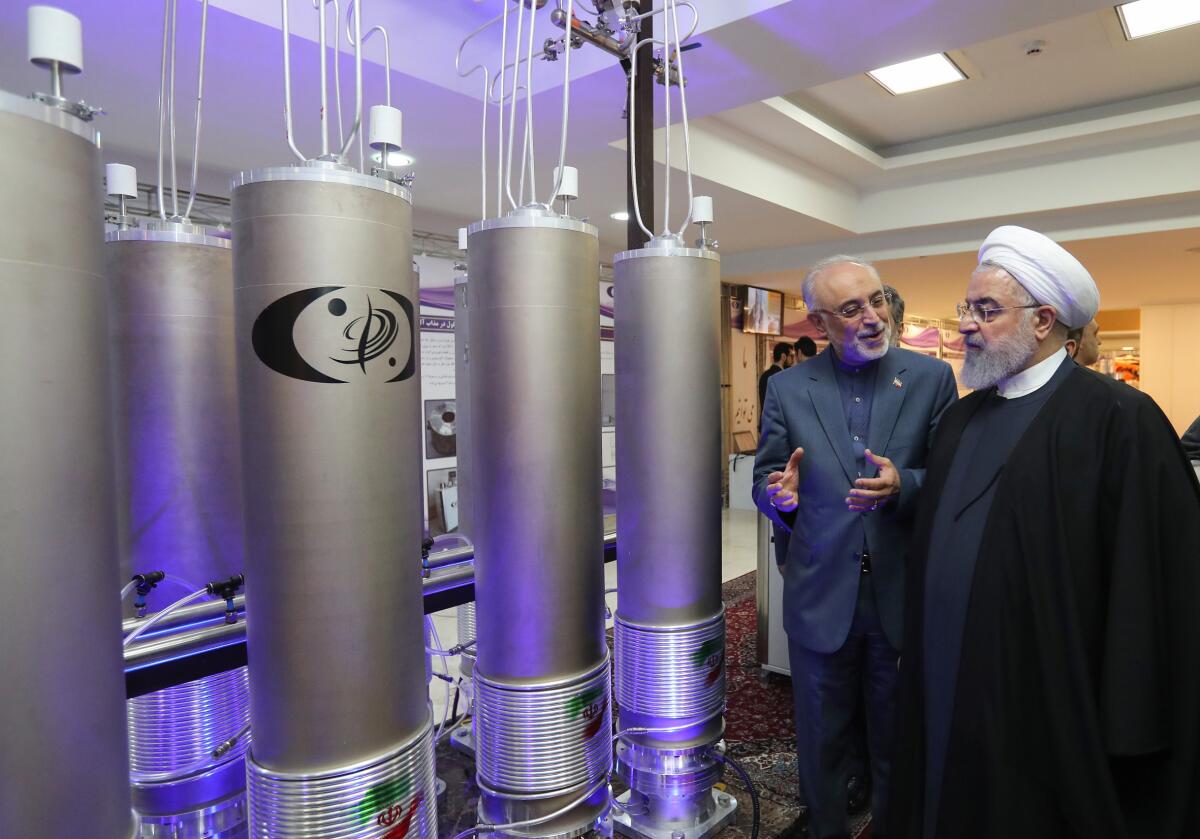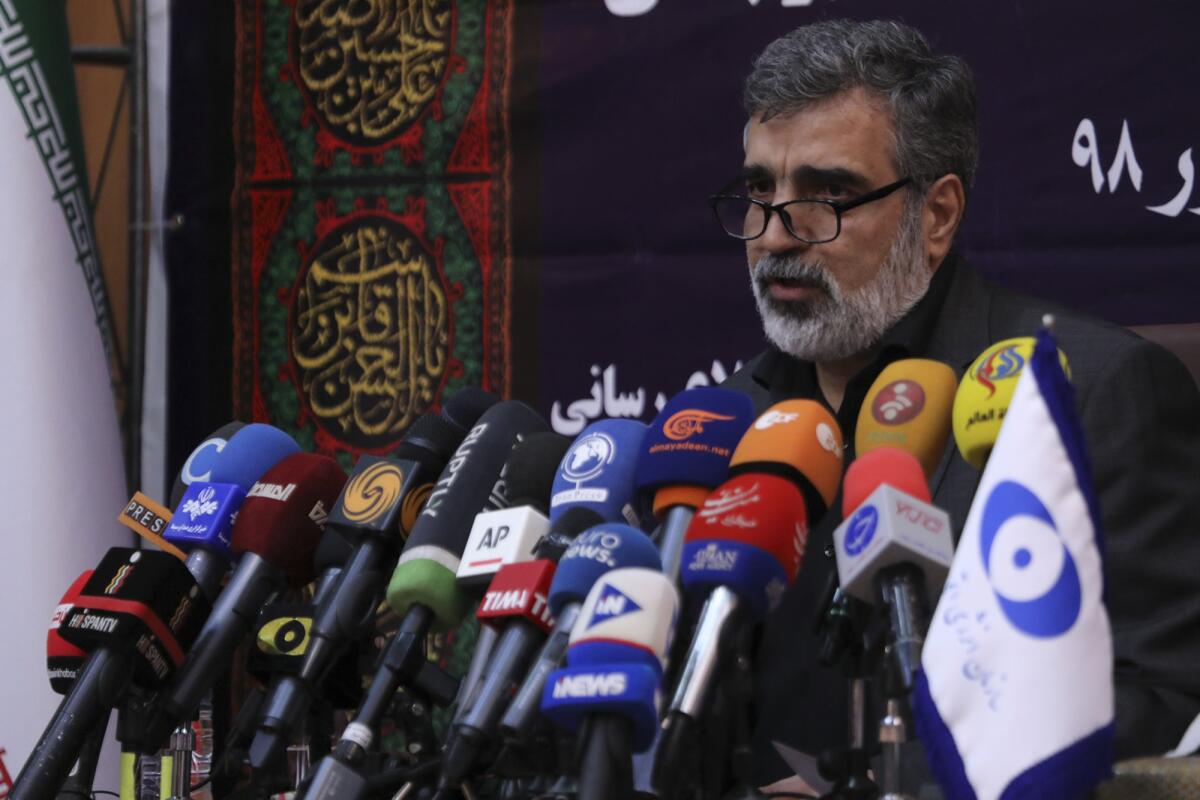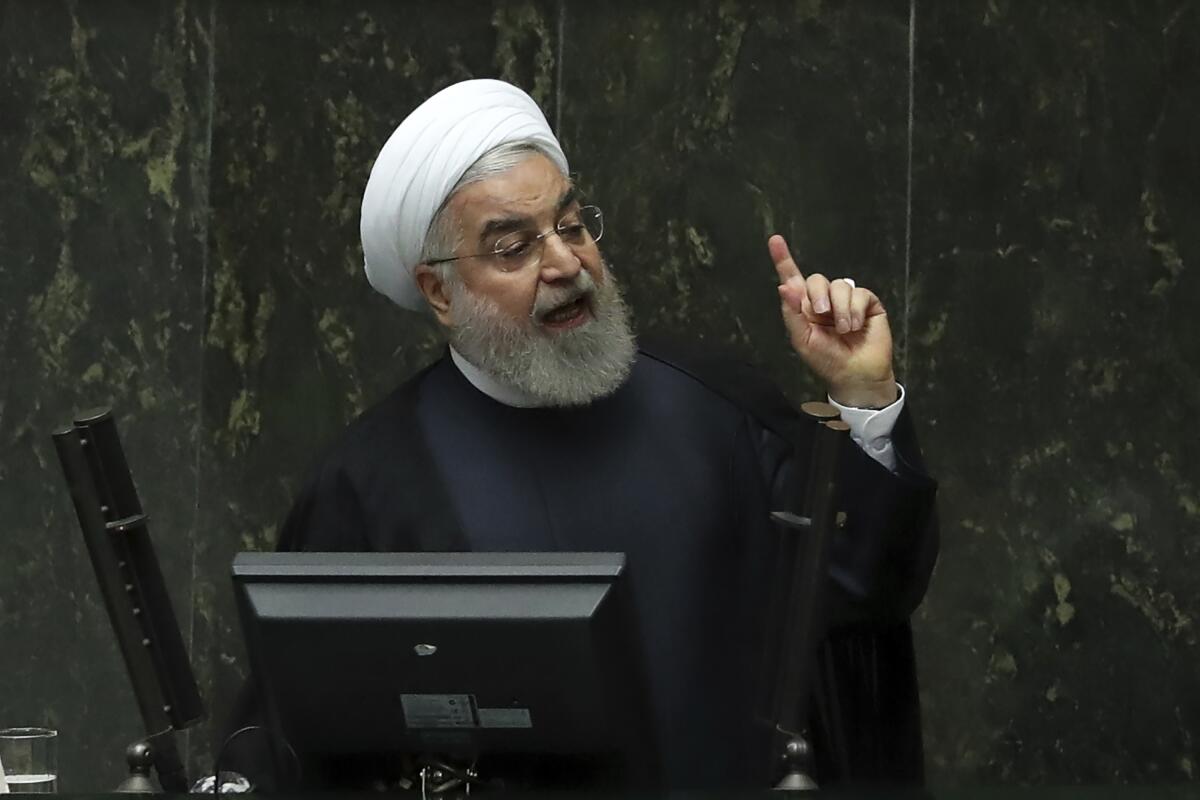Iran backs off more nuclear deal commitments, heightening concern about the agreement’s future

- Share via
Tehran — In a move that analysts said is aimed at amping up the pressure on European powers to salvage the landmark 2015 nuclear treaty and ease the impact of U.S. economic sanctions that accompanied President Trump’s withdrawal from the international accord, a senior Iranian government official announced Saturday that Iran would speed up its uranium enrichment activities. The action marked the third and most serious move by Iran to back off from the agreement signed by seven nations.
Behruz Kamalvandi, a spokesman for Iran’s Atomic Energy Organization, said the Islamic Republic has activated a chain of advanced centrifuges and added that European signatories of the deal — Britain, Germany and France — need to quickly back up a promise to secure financial relief from the 2018 U.S. sanctions.
“These steps are reversible if the other side fulfills its promises,” Kamalvandi said at a news conference broadcast by Iran’s state television.
American and Iranian analysts said Tehran is seeking to counter Trump’s economic pressure campaign, which has crippled Iran’s economy.
“We are still far from a scenario where they would rush to make a bomb quickly,” said Ariane Tabatabai, an associate political scientist at the Rand Corp. think tank in Washington, “but the Europeans have been unable to deliver what Iranians want because their efforts are stymied by the U.S.”

Kamalvandi said that the Atomic Energy Organization of Iran has begun using 20 IR-6 centrifuges and an additional 20 IR-4 centrifuges, accelerating the country’s ability to increase its stockpile of enriched uranium on an industrial scale.
Doing so, experts said, reduces the amount of time needed for Tehran to stockpile the fissile material needed to build a nuclear weapon — if authorities chose to do so. For years, Iranian officials have said they have no intention of building a nuclear weapon and that their nuclear program is peaceful.
Although the signatories of the nuclear deal — also including China and Russia — have largely upheld their side of the agreement, Trump’s withdrawal from the treaty and imposition of “secondary sanctions” has made it difficult for Western signatories to help ease the financial impact.
Trump withdrew from the deal in May 2018, despite the ongoing conclusions of U.N. inspectors that Tehran was complying with the accord meant to keep it from developing the capacity to build nuclear weapons.
Trump claims the accord is a “disastrous one-sided deal” and said it hasn’t stopped Iran from engaging in “malign activity.”
Administration officials contend that their so-called maximum-pressure campaign is working and will force Iran back to the negotiating table in order to agree to heavier monitoring of its nuclear activities, remove clauses in the accord that would lift limits on Tehran’s ability to enrich uranium in several years, and curb Iran’s military power and its support of militant groups in the Middle East.
Iran began backing away from the nuclear deal in May when President Hassan Rouhani announced on national TV that the country would allow its stockpile of low-enriched uranium to surpass a 660-pound limit.

Rouhani added that Tehran would reduce its commitments every 60 days unless the Western signatories helped protect Iran from U.S. sanctions against sales of oil — the country’s main source of income — which have fallen 80%.
As European leaders scrambled to work out a deal, Iranian authorities announced in July that the country would violate the accord for a second time by producing uranium at a 5% enrichment level.
(Under the agreement, Iran is allowed to stockpile no more than 660 pounds, with a less than 4% concentration of U-235.)
European efforts to save the deal have been stymied by the severe U.S. restrictions on Iran’s banking and financial institutions, which have made it difficult for the international community to do business with Iran.
France has nonetheless stepped up efforts, but minimal progress has been reported. At the Group of 7 economic summit in France last month, Trump and other leaders set off speculation that the U.S. was planning a presidential summit with Iran. But Iranian President Hassan Rouhani suggested the next day that such a meeting would be pointless unless the U.S. first lifted sanctions.
Tabatabai said that while Iranian authorities understand that the status quo isn’t sustainable, its incremental steps of backing away from the deal helps Tehran buy time before upcoming parliamentary elections and the U.S. presidential election.
“There is an understanding that Trump may be elected...then they will have to negotiate with Trump, but if not Iran will have leverage with a Democrat in office,” Tabatabai said. “Iran has limited tools it can play with and that’s why it has taken more minor incremental steps.”
Iran’s most recent breach of the nuclear deal came as European leaders mull over an initiative suggested by France that would grant Iran a $15-billion line credit line. Iranian government spokesman Ali Rabiee told reporters this week that negotiations have resulted in progress, but there’s still a long road ahead.
Tabatabai said Europe’s efforts have also been made difficult because the Trump administration believes providing Tehran with an economic lifeline would undermine its pressure.
“The challenge is that the U.S. doesn’t want Iran to sell oil because allowing Iran to do so would undercut [U.S. policy toward Iran],” Tabatabai said.
Other analysts said Iran’s strategy runs the risk of backfiring.
Feraydoune Majlesi, an analyst based in Tehran, said he worried that Iran’s diminishing commitment to the nuclear accord is counterproductive because its rhetoric could push European leaders toward the side of the U.S.
“In diplomacy we must give and take. Iran is threatening and using ultimatums,” Majlesi said, adding that “the step-by-step diminishing of the commitment of the nuclear deal is not serving the national interests of Iran.”
Special correspondent Mostaghim reported from Tehran and staff writer Etehad from Los Angeles.
More to Read
Sign up for Essential California
The most important California stories and recommendations in your inbox every morning.
You may occasionally receive promotional content from the Los Angeles Times.











